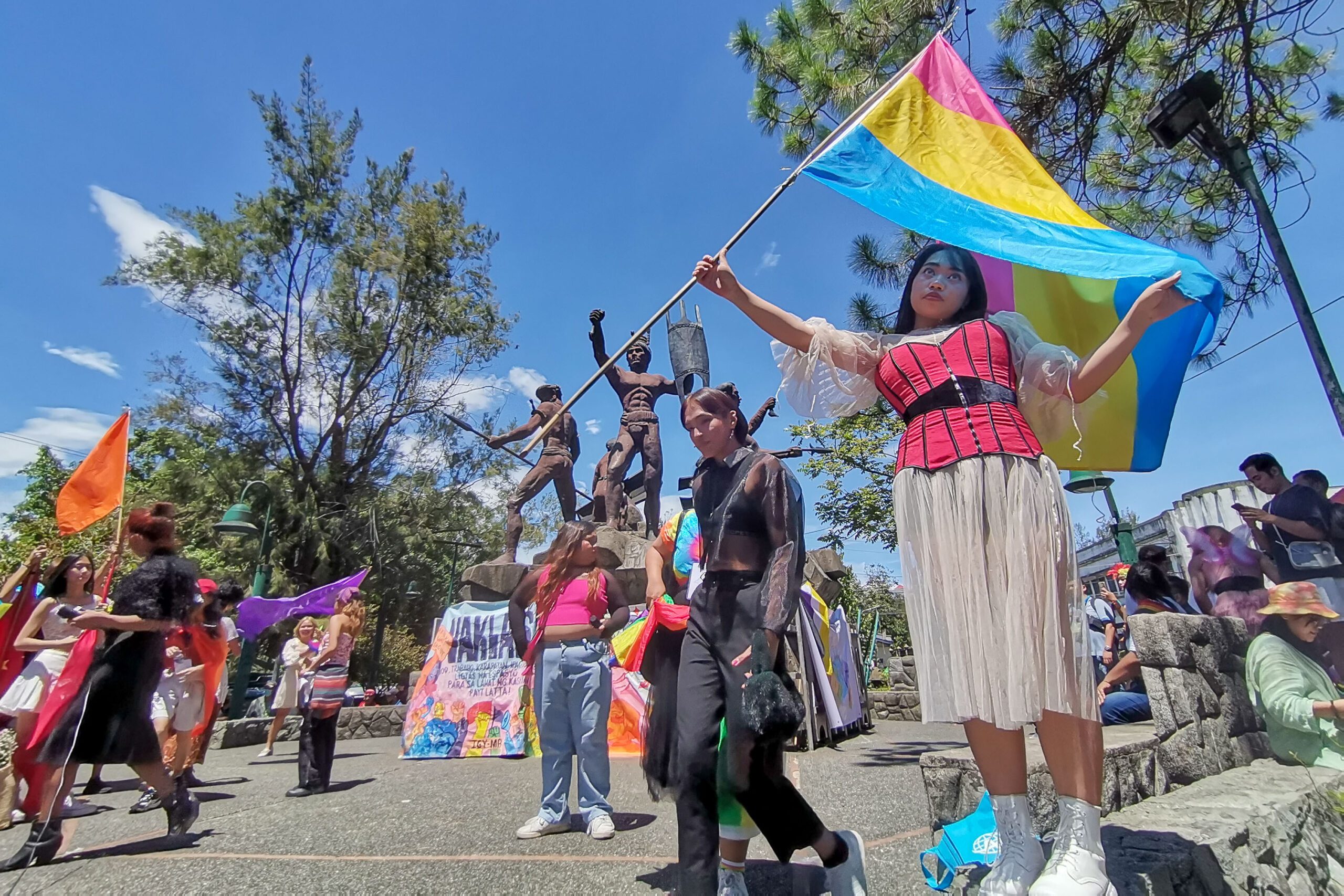SUMMARY
This is AI generated summarization, which may have errors. For context, always refer to the full article.

BAGUIO, Philippines — The country’s summer capital offers a “welcoming environment” for LGBTQ+ folk, but discrimination in workplaces and schools still discourage full expression of identity, according to representatives of the community.
The tourist and education center in the Cordilleras commemorated International Pride Month on Saturday, June 24 with around 500 advocates staging a parade.
Major events provide avenues for displays of diversity, said Chawie Vergara of Bahaghari Saint Louis University.
Aside from the June celebration, Baguio also has its Pride event every November. The city government and the local LGBTQ+ community also collaborated for the Mardi Gras during the 2023 Panagbenga Festival, Vergara said.
“While there exists a generational gap in the appreciation of LGBTQ+ culture, the number of students in the city affects their acceptance,” Vergara said.
Students are more open to ideas and tend to influence public perception by initiating broader conversations on LGBTQ+ concerns, the student leader pointed out.
Baguio’s prominence as a tourist destination has also encouraged the city to be inclusive and open to various cultures.

‘Supportive businesses’
Herson Arcega, the co-chair of Northern Luzon Pride, believes the vibrant LGBTQ+ community also benefits from the business community’s support.
“We have a lot of sponsors, (and even) small businesses are very supportive in our activities,” he said.
Business owner Ryan Javier shared the same view: “The business community has become more welcoming, and many are interested in booking [LGBTQ+] performers.”
Javier owns Planet G Music Box, one of only two bars in the city designed to cater to the community. The establishment opened eight years ago.
“It was established as a space for LGBTQ+ community events and performances, and became an open platform for Baguio performers,” he shared.
Javier said they established Planet G not only as a business but mainly to support talents and to develop and recognize the LGBTQ+ community.
“In the past, you would see a specific crowd at the bar, and you knew it was LGBTQ, but now you see straight people attending as well. The appreciation and recognition for the LGBTQ community in Baguio have grown,” Javier added.
Days before the march, several business establishments in the city also hung rainbow flags and colors, including Ili Likha, the art and food hub owned by National Artist of Film Kidlat Tahimik.
Discrimination still prevalent
Although the local government supports LGBTQ+ community initiatives, advocates agreed that equality and making safe spaces for LGBTQ+ members the norm in the city remains a struggle.
“Discrimination is still prevalent in workplaces and schools,” Arcega said, [and] because it is prevalent, community members truly feel the effects.”
He cited prohibitions on cross-dressing and other forms of expression in educational institutions. In the workplace, it is not much about the pay and benefits but rather about how LGBTQ+ are treated, especially in jobs perceived as masculine.
For Vergara, fear lingers wherever she goes: “Regarding creating safe spaces for LGBTQ+, there is still no safe space. Everywhere I go, I fear that I will be discriminated against or become a victim of hate crime.”‘
She said this is why many of their members are still reluctant “even to wear the clothes we are comfortable with.”
Estelle Lopez, Amnesty International Philippines regional coordinator for Cordillera, explained that “microaggressions” and conservative comments about LGBTQ+ persons remain common.
“Baguio may appear safe but there is still numerous times that [we] experience microaggressions,” she said.
“There are existing cultural barriers, particularly the macho culture, which is more pronounced in the Cordillera region. It is a culture where one cannot be perceived as soft,” Lopez added.

Institutionalize protection
Vergara said implementing the city’s antidiscrimination ordinance would be a step towards achieving a “safe space” for their community.
“We have the antidiscrimination ordinance but there are still no implementing rules and regulations. The city should work on this to strengthen the legislation,” she said.
The city passed in 2017 its Antidiscrimination Ordinance, which protects individuals from discrimination based on age, religion, ethnicity, health status, disability, sexual orientation, and gender identity.
But advocates stressed that a nationwide Sexual Orientation and Gender Identity and Expression (SOGIE) law remains the primary goal for the protection of LGBTQ+ rights.
“Our biggest challenge is still the passing of the SOGIE bill. For us, it is the most crucial protection we need to ensure sufficient recognition, respect, and equal footing for the LGBTQ+ community compared to heterosexual people,” said Arcega.
The Senate Committee on Women, Children, Family Relations, and Gender Equality approved the proposed legislation in December last year. The House Committee on Women and Gender Equality also passed the counterpart bill in May 2023.
Meanwhile, Lopez said that besides ensuring the IRR for the antidiscrimination ordinance and the passage of the SOGIE bill, local governments should stress education.
“Education should be one of the priorities. People here in Baguio are willing to listen. We need to enhance their understanding of microaggressions and why they affect LGBTQ people,” she explained.
She also appealed to the church for understanding, being one of the “conservative pillars,” saying they are not looking for special treatment but a community “hoping for acceptance from everyone.” – Rappler.com
Add a comment
How does this make you feel?

















![[In This Economy] Why the SOGIE equality bill is a step toward a more just Philippines](https://www.rappler.com/tachyon/2024/06/tl-sogie-equality.jpg?resize=257%2C257&crop=320px%2C0px%2C720px%2C720px)
There are no comments yet. Add your comment to start the conversation.